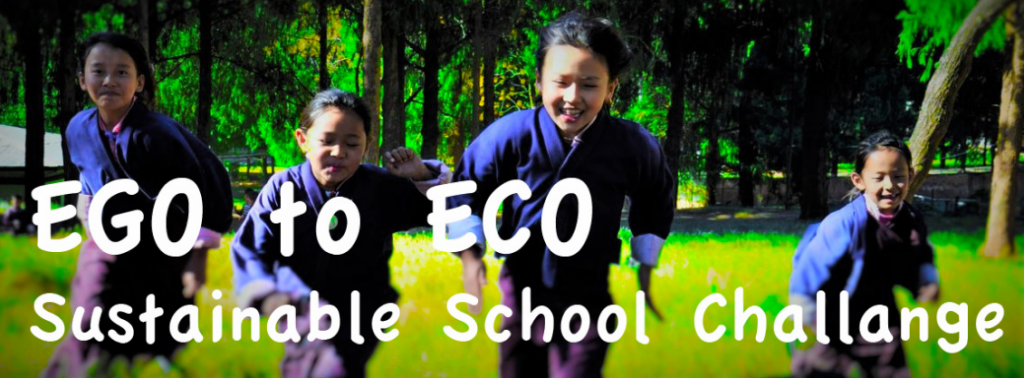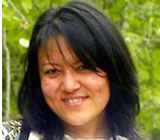EGO to ECO: A sustainable School Challenge!

2 August 2016, Thimphu, Bhutan - In the words of Nelson Mandela, “Education is the most powerful weapon which you can use to change the world.” Our world faces grave social and environmental problems, ones that are only bound to exacerbate in coming years. Developing the creativity, critical thinking, and problem solving skills of the today’s youth is key to bringing about a positive change in society and moving past a deadlock of economic, social and environmental crises.
In the small mountainous country of Bhutan, UNITAR is supporting a project that aims to give an arena for youngsters in nine schools in the capital city of Thimphu to re-think their consumption habits and find ways to consume mindfully, causing less negative impact to their own lives, the society and the environment. Framed as a school competition, the EGO-to-ECO project involves children as a co-creators of the solutions to the real-life every-day problem of unsustainable consumption. The most impactful and innovative ideas are recognized and awarded.
 The project is implemented by Ms Pem Lama and her friends: a group of young, like-minded, and passionate sustainability practitioners. For years now, Ms Lama has supported effort of the Government to change consumption patterns in public institutions by setting up and implementing strategies for green public procurement (GPP) in Bhutan, under the GPP Bhutan SWITCH-Asia Project. Ms Lama shares with the students that as a child she was terrified by ghosts until she realised that humans are scarier! “But humans can be nice too”- says Ms Lama. “Our hearts are capable of love and care and our brains help us imagine and invent. That’s why my life goal is to help us be better and more caring so that I can live in a world where the only scary thing is a horror movie!”
The project is implemented by Ms Pem Lama and her friends: a group of young, like-minded, and passionate sustainability practitioners. For years now, Ms Lama has supported effort of the Government to change consumption patterns in public institutions by setting up and implementing strategies for green public procurement (GPP) in Bhutan, under the GPP Bhutan SWITCH-Asia Project. Ms Lama shares with the students that as a child she was terrified by ghosts until she realised that humans are scarier! “But humans can be nice too”- says Ms Lama. “Our hearts are capable of love and care and our brains help us imagine and invent. That’s why my life goal is to help us be better and more caring so that I can live in a world where the only scary thing is a horror movie!”
Her views are not foreign to Bhutanese people. Ever since the late Fourth King of Bhutan formulate the visionary statement that “Gross National Happiness” is more important than “Gross Domestic Product” in the 1970s, Bhutan has been a lauded as a global leader in environmentally sustainable development. The country strives towards equitable socio-economic development, preservation of culture, conservation of the environment and good governance.
The EGO-to-ECO competition takes place in the period 1 July – 1 October of this year. The project is supported with a small grant following the delivery of the 3rd edition of the e-learning course “Introduction to Sustainable Consumption and Production in Asia”, developed and delivered jointly by UNITAR and UNEP, within the framework of the SWITCH-Asia Programme of the European Union. Ms Lama participate in the course, developed the concept of the sustainability school competition as part of the course activities, and applied for funding to realize her project within the framework of the training.

The project was kicked-off with the development of a project website: http://egotoeco.net/, which curates information on important deadlines, learning resources, and participating schools. Informative as it is, the website is even richer in ideas – grown-ups and kids alike can profit from learning and reflecting upon the importance of care and empathy, the concept of interdependencies at all levels in nature and society, and the consequences our lifestyles and consumption have on others and the environment.
After receiving a brief 3-hours seminar on those issues, delivered in their respective schools, the youngsters work with their teachers and schools to develop and submit their solutions by 28 of September 2016.
The 1 October is the day that is all comes together. Students, teachers, parents, public officials, local media, and ordinary citizens… all meet at the heart of Thimphu city, the clocktower square, for the EGO-to-ECO Sustainability School Fair! Schools will set up their individual stalls showcasing what their schools did for the challenge in the past 2 months. There will be poster presentations and other exhibits (e.g. recycled products made by kids). Formal inauguration and judging will take place in the morning, followed by the award ceremony. The fair will continue till late afternoon. Awards are given in two categories:
- Sustainable School Award, given to the respective school that demonstrates the greatest progress toward sustainable living.
- Sustainable Ambassador Award, given to one student from each participating school who promotes sustainability in their families and communities
Perhaps the most amazing and significant feature of the EGO-to-ECO competition is that is recognizes children formally as agents of change, rewarding and encouraging their contribution to the better tomorrow. True, children have to be educated, but they can also serve as educators within their respective circle of friends and family. The impact of the project aims to have goes well beyond the school courtyards: by applying the “Feel-Imagine-Do-Share” methodology, children can contribute to behaviour change and positive action for sustainable lifestyle in society.
After all children must be taught how to think, not what to think, and this what EGO-to-ECO aims to achieve. We will follow closely and with great interest the progress of this school event, which goes well beyond the limits of conventional education

